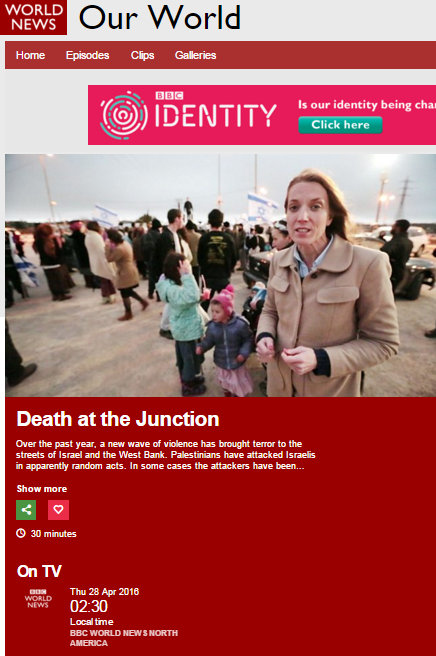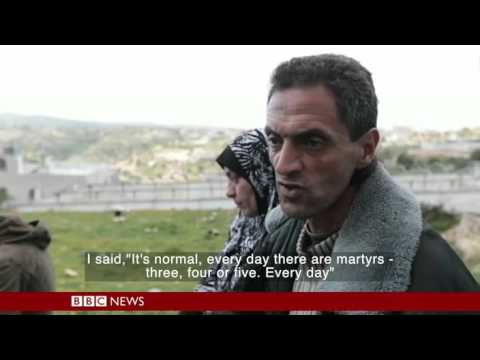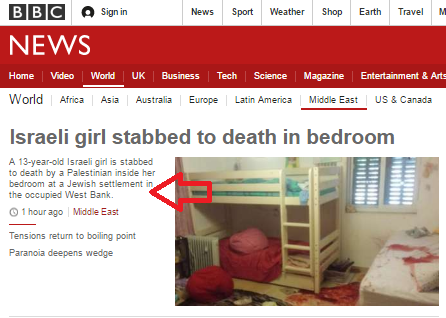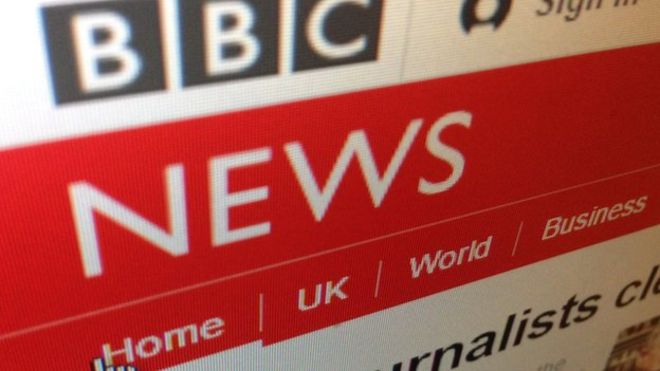On April 23rd the BBC World News television channel aired a half-hour long filmed report by the BBC Jerusalem bureau’s Yolande Knell on its ‘Our World’ programme. Titled ‘Death at the Junction’ (available for a limited period of time on iPlayer here and also here), the report was broadcast four times on that particular day, with a further eleven repeats scheduled. Its synopsis reads as follows:
“Over the past year, a new wave of violence has brought terror to the streets of Israel and the West Bank. Palestinians have attacked Israelis in apparently random acts. In some cases the attackers have been young teenagers, armed with kitchen knives. The Gush Etzion junction is one site of many attacks. It’s on the main road between Jerusalem and Hebron and is used by thousands of Jewish settlers. The junction used to be a place where Palestinians would also shop and work. Now people are scared that being there could cost them their lives. The film contains disturbing images from the start.”
An audio version of the report (from 05:41 here) was also aired on BBC Radio 4’s ‘From Our Own Correspondent’ on April 23rd with the synopsis reading:
“In the West Bank a roundabout encapsulates what’s going on, and going wrong, in the Israel-Palestinian conflict.”
Both reports raise a number of issues – including the following claims from FOOC presenter Kate Adie in her introduction to the audio item:
“In the past six months young Palestinians have carried out a series of stabbings, shootings and car rammings. Some 30 Israelis have been killed and the state response is usually lethal with about 200 Palestinians killed; most of whom – Israel says – were carrying out attacks.” [emphasis added]
With ‘usually’ meaning what typically or normally happens, it is worth taking a closer look at that claim from Adie. The Meir Amit Intelligence and Terrorism Information Center produced an overview the seven months of violence between mid-September 2015 and mid-April 2016 which does not support Adie’s use of the term ‘usually’ or her employment of the qualifier “Israel says”.
“Two hundred forty terrorists were involved in the 204 significant terrorist attacks, that is, most of the attacks were carried out by single attackers. In addition, at least 59 terrorists were detained during preventive activities, so that the total number of terrorists who carried out or planned to carry out terrorist attacks was at least 299.
Of the 240 terrorists who carried out significant terrorist attacks, 138 were killed during the attacks. Two were killed in “work accidents” (one in a car crash and one when an IED blew up in his hands). One hundred and two terrorists were apprehended and detained while carrying out attacks, or escaped.
What is the overall number of Palestinians killed during the current terrorist campaign? Dozens of Palestinians who were killed rioting against the Israeli security forces can be added to the 138 terrorists killed while carrying out significant terrorist attacks. According to the Palestinian Red Crescent (April 2, 2016), the total number of Palestinians killed is 204. That figure may indicate that 66 Palestinians were killed during riots, of whom 27 were killed in the Gaza Strip (according to an NGO calling itself the “National Association of Shaheed Families”). Therefore, 39 were killed in Judea and Samaria (Note: Since the count was not carried out by the ITIC, there is no certainty that the numbers are correct, but in ITIC assessment they accurately reflect the situation).”
Adie also tells listeners that:
“Yolande Knell has been to a previously peaceful junction in the occupied West Bank that’s become a flash point.”
Was the Gush Etzion junction really “previously peaceful”? In fact numerous fatal and non-fatal terror attacks have been perpetrated at that location over the years.
Notably, both the audio and filmed reports include some exceptionally rare – if brief – BBC reporting on the history of the location. In the audio report Knell tells listeners that:
“In the early 20th century Jews bought land in this area but in fighting with Arab armies in 1948 they were forced out or killed. After Israel captured the West Bank in the 1967 war, Jews returned. Settlements are seen as illegal under international law but Israel disagrees.”
A similar portrayal is given in the filmed item, with Knell concluding her short excursion into history by telling audiences that following the Six Day War, Israelis:
“…began to rebuild Kfar Etzion. It was the first settlement in the occupied West Bank after the war. Settlements are Jewish communities built on occupied land. They’re considered illegal under international law but Israel disagrees.”
Revealingly, Knell does not provide any explanation – or logical legal argument – to support her claim that communities built on land purchased by Jews and then belligerently occupied by the invading Jordanian army for a period of 19 years are now “illegal”. As ever, audiences are not informed that the interpretation of ‘international law’ adopted and promoted by the BBC is contradicted by additional legal opinions or that past peace proposals have included Gush Etzion in areas which would remain under Israeli control.
Moreover, Knell goes on to encourage her audiences to view the location as ‘Palestinian land’, telling viewers that:
“Gush Etzion – Hebrew for the Etzion bloc – is now thirty times larger than the original sites. Ninety thousand people live in more than 20 settlements and much of it is built on confiscated Palestinian land.” [emphasis added]
And telling Radio 4 listeners that:
“Now Gush Etzion is thirty times larger than it was historically. Areas of Palestinian land have been added to it causing deep resentment.” [emphasis added]
Knell makes no effort to contribute to her audiences’ understanding of the factors – including Ottoman land laws – which form the basis for land classification in Judea & Samaria and neither does she inform them of the 1979 Israeli government decision according to which new communities in Judea & Samaria would be constructed exclusively on state land, the resulting land surveys intended to prevent construction on land privately owned by Palestinians or of the fact that under the terms of the Oslo Accords, Israel is responsible for zoning and planning in Area C – which includes Gush Etzion. Instead, Knell dumbs down the picture presented to listeners and viewers of these reports by use of the inaccurate, misleading – and politicised – term “Palestinian land”.
The use of inaccurate and misleading language is also seen in the filmed report’s portrayal of the topic of Palestinian building:
“Khirbat Zachariah is surrounded by the Gush Etzion settlements and Mohammed Saad says life has become harder and more risky with new security measures at the [Gush Etzion junction] roundabout. […] Already Palestinians here feel great resentment. They’re forbidden from building by the Israelis whilst the neighbouring settlements are allowed to expand.”
Knell refrains from clarifying to her audiences where “here” is exactly and fails to prevent confusion by informing audiences that the vast majority of Palestinian towns and villages in Gush Etzion are located in Area A or Area B – meaning that their requests for planning permission and building permits are submitted to the Palestinian Authority. Khirbat Zachariah (also Sakariya) is indeed located in Area C and hence falls under Civil Administration planning laws but Knell’s report does not include any mention of the help Saad and his fellow villagers have received on that front from their neighbours in Gush Etzion.
In the filmed report Knell goes on to tell viewers that:
“The villagers (of Khirbat Zachariah) have lost parts of their land to the settlements. Most can no longer earn a living from their own farms.”
And in the audio version listeners hear the following:
“‘It’s difficult’ says Mohammed Saad, a farmer, as he prunes his grapevines.’Israel forbids us from building and we’ve lost some land’.”
BBC audiences are not told that the residents of Khirbat Zachariah were originally tenant farmers who rented land from an Arab Christian family from Bethlehem. The land was sold to a subsidiary company of the Jewish National Fund in 1944 before the family emigrated to America and when one resident of the Khirbat Zachariah claimed ownership of the land after the Jordanian occupation of the area in 1948, he lost the case in a Jordanian court and subsequently, in 1980, his claim of ownership of the land was also rejected by the Israeli High Court of Justice.
Additional aspects of Knell’s reports will be discussed in part two of this post.
Related Articles:
Looking beyond the BBC’s simplistic portrayal of Gush Etzion
BBC’s Yolande Knell ditches any semblance of impartiality





